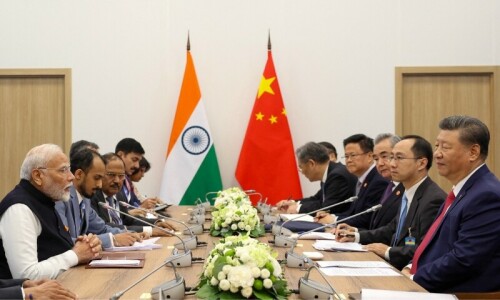ISLAMABAD, March 5: Rising world food prices will make it difficult for the new government to contain the soaring food inflation at least in the short term, officials and analysts told Dawn on Wednesday.
They say this is no more an issue of a crackdown on cartels or hoarders; the rising food prices have become an international issue. The task of the policy-makers of the new government would be to lessen its impact on the domestic market.
Economic Adviser to the Finance Ministry Dr Ashfaq Hassan Khan told Dawn the days of cheap food and energy were over. “You cannot live in isolation from the international market,” he said.
Mr Khan claimed the food prices were still less in Pakistan than in the international market.
The recent report of the World Trade Organization said the price of wheat had risen to the highest ever at more than $400 per ton in the international market. The food prices had witnessed an increase of 33 per cent over the past year, the report added.
It says that cereal producing countries like the US, EU states, Canada, Russia, Ukraine and Australia suffered shortfall owing to bad weather. This shortfall in production will increase the world prices. In Pakistan, grain crops witnessed a decrease in area and production by 8 per cent and 20 per cent respectively, during the current season.
The report quoting the International Food Policy Research Institute estimates that cereal prices would rise by 10-20 per cent by 2015.
An economist attached to the government said the new government would have to allocate an amount of around Rs60 billion in the budget for subsidising food prices for the poor segment of society.
He said this amount could easily be generated by additional taxation measures on the import of luxury items. The import bill of mobile phones increased to $833.555 million in the year 2006-07 from $82.012 million in 2002-03, an increase of 916 per cent.
He said minor adjustments in taxation on mobile phones could generate billions of rupees to be used for offsetting the price spiral for poor consumers. This list may include many more items which currently enjoying duty-free status.
Economist Dr A. R. Kemal told Dawn that the new government should allocate funds for introducing new varieties of seeds to increase per acre yield of essential foodgrains.
He said growers should be given incentives on a long-term basis to ensure a due return for their produce. “You cannot deny due returns to growers in line with international market,” he added.
Official figures showed that Minfal had so far failed to come up with concrete measures to increase the per acre yield of essential foodgrains. The yield of wheat per hectare was 2490 kgs in 1999-2000, which increased only to 2,519 kgs in 2005-06.
The situation is the same for rice and its yield per hectare reaches to 2,116 kgs in 2005-06 from 2,021 kgs in 2000-01. Almost similar stagnation was in maize, bajra, jowar, barley and sugarcane.
The figures showed that production of essential food commodities witnessed a substantial decline in the current season and prices of these products witnessed a double-digit growth. Therefore, it would be difficult to control prices in the domestic market in short term.
Along with the flour crisis, officials and analysts are fearful of a shortage of rice in the wake of unchecked exports of rice. In July-Jan 2008, the export of rice witnessed a growth of over 24 per cent.
A source told this correspondent that bureaucrats in the Ministry of Food and Agriculture were resisting any policy seeking regulation of rice exports. The domestic market has already witnessed more than 100 per cent increase in the price of rice over the past few months.
The shortage of rice is being experienced all over south and east Asia. Other rice-producing countries in the region, such as India, Thailand and Vietnam, have taken measures to discourage export to protect the interest of consumers.












































Dear visitor, the comments section is undergoing an overhaul and will return soon.